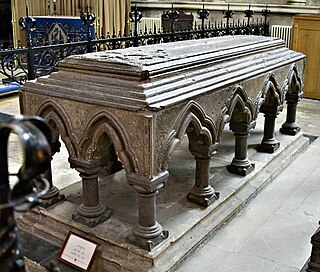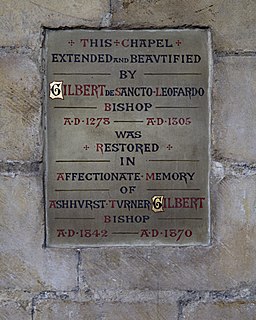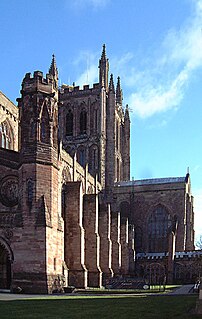Related Research Articles
Robert of Ghent or Robert de Gant was Lord Chancellor of England and Dean of York in the 12th century. The younger son of a nobleman, Robert was probably a member of the cathedral chapter of York before his selection as chancellor by King Stephen of England in the mid-1140s. He is not mentioned often in documents from his time as chancellor, but why this is so is unknown. He became dean at York Minster around 1147. Robert was slightly involved in the disputes over who would be Archbishop of York in the late 1140s and 1150s, but it is likely that his chancellorship prevented his deeper involvement in diocesan affairs. He was no longer chancellor after the death of Stephen, but probably continued to hold the office of dean until his death around 1157 or 1158.
Henry Wingham was a Lord Chancellor of England and Bishop of London.
John Chishull or John de Chishull was Lord Chancellor of England, Bishop of London, and Lord High Treasurer during the 13th century. He also served as Dean of St Paul's.

Sewal de Bovil was a medieval Archbishop of York.
John Blund was an English scholastic philosopher, known for his work on the nature of the soul, the Tractatus de anima, one of the first works of western philosophy to make use of the recently translated De Anima by Aristotle and especially the Persian philosopher Avicenna's work on the soul, also called De Anima. He taught at Oxford University along with Edmund of Abingdon. David Knowles said that he was "noteworthy for his knowledge of Avicenna and his rejection of the hylomorphism of Avicebron and the plurality of forms.", although the problem of the plurality of forms as understood by later scholastics was not formulated explicitly in Blund's time. Maurice Powicke calls him the "first English Aristotelian."
William of St. Barbara or William of Ste Barbe was a medieval Bishop of Durham.
Roger Niger was a thirteenth-century cleric who became Bishop of London. He is also known as Saint Roger of Beeleigh.
Simon Langton was an English medieval clergyman who served as Archdeacon of Canterbury from 1227 until his death in 1248. He had previously been Archbishop-elect of York, but the election was quashed by Pope Innocent III.
William Langton was a medieval English priest and nephew of Archbishop Walter de Gray. William was selected but never consecrated as Archbishop of York and Bishop of Carlisle.
Roger of Salisbury was a Bishop of Bath and Wells.
William of Bitton was a medieval Bishop of Bath and Wells.
John of Greenford was a medieval Bishop of Chichester.
Seffrid II was an English cleric who served as a medieval Bishop of Chichester.
Simon of Wells was a medieval Bishop of Chichester.

Gilbert de St Leonard was a medieval Bishop of Chichester.
Ralph Walpole was a medieval Bishop of Norwich and Bishop of Ely.

Richard Swinefield was a medieval Bishop of Hereford, England. He graduated doctor of divinity before holding a number of ecclesiastical offices, including that of Archdeacon of London. As a bishop, he dedicated considerable efforts to securing the canonisation of Thomas de Cantilupe, his predecessor, for whom he had worked during his lifetime. Active in his diocese, he devoted little time to politics. He was buried in Hereford Cathedral where a memorial to his memory still stands.
Richard of Gravesend was a medieval Bishop of Lincoln.
Henry of Sandwich was a medieval Bishop of London.
Richard Gravesend was a medieval Bishop of London.
References
- Fryde, E. B.; Greenway, D. E.; Porter, S.; Roy, I. (1996). Handbook of British Chronology (Third revised ed.). Cambridge, UK: Cambridge University Press. ISBN 0-521-56350-X.
- Greenway, Diana E. (1996). "Archdeacons: Chichester". Fasti Ecclesiae Anglicanae 1066-1300. Vol. 5: Chichester. Institute of Historical Research. Retrieved 21 October 2007.
- —— (1996). "Bishops". Fasti Ecclesiae Anglicanae 1066-1300. Vol. 5: Chichester. Institute of Historical Research. Archived from the original on 8 February 2012. Retrieved 21 October 2007.
- —— (1996). "Chancellors of Chichester". Fasti Ecclesiae Anglicanae 1066-1300. Vol. 5: Chichester. Institute of Historical Research. Archived from the original on 9 August 2011. Retrieved 21 October 2007.
- —— (1996). "Unidentified Prebends". Fasti Ecclesiae Anglicanae 1066-1300. Vol. 5: Chichester. Institute of Historical Research. Retrieved 21 October 2007.
- Stubbs, William (1897). Registrum Sacrum Anglicanum: An Attempt to Exhibit the Episcopal Succession in England (Second ed.). Oxford: Clarendon Press. OCLC 2453386.